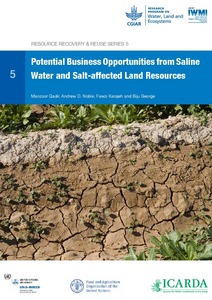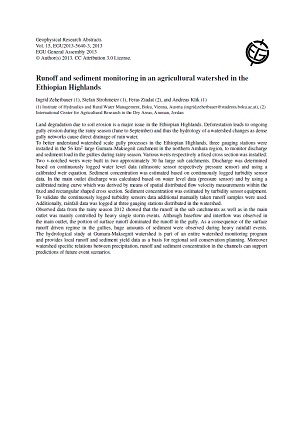degradação de terras
AGROVOC URI:
Proceedings of the Launching Workshop of the Agricultural Water Management Platform, Addis Ababa, Ethiopia, 15-16 January 2015
Quesungual slash mulch agroforestry systems (QSMAS): improving crop water productivity, food security and resource quality in the sub-humid tropics
Rehabilitation of degraded land in India through community-based initiatives
Employs participatory approach to rehabilitate common property resources by developing biodiesel plantations through 1) consortium approach among govt. line departments, NGOs, CBOs, and ICRISAT; and 2) collective action
Rehabilitacion de areas degradadas en la Amazonia peruana: revision de experiencias y lecciones aprendidas
The study was caried out in Peru in 2003 and 2004. The study aims to increase the chances of future success of forest rehabilitation efforts by identifying the strategies that best contribute to long-term sustainability with minimal negative effects on stakeholders. Specifically, the study derives strategic lessons from the past and ongoing initiatives. The study identifies and disseminate the most promising approaches and incentives for rehabilitation in different ecological and socio-economic situations.
Romper los ciclos de degradacion de la tierra: estudio de un caso en Ban Lak Sip, Republica Democratica Popular Lao. In SpanishBreaking the cycles of land degradation: a case study from Ban Lak Sip, Lao PDR
This issue of Water Policy Briefing is based on research presented in When ?Conservation? Leads to Land Degradation: Lessons from Ban Lak Sip, Laos (IWMI Research Report 91) by Guillaume Lestrelin, Mark Giordano and Bounmy Keohavong. The research was carried out by the Managing Soil Erosion Consortium (MSEC)?a multi-country collaborative effort to better understand land degradation, and potential solutions, in upland areas of Southeast Asia. MSEC is coordinated by IWMI with substantial contributions from France?s Institute of Research for Development (IRD).
Runoff and sediment monitoring in an agricultural watershed in the Ethiopian Highlands
Land degradation due to soil erosion is a major issue in the Ethiopian Highlands. Deforestation leads to ongoing gully erosion during the rainy season (June to September) and thus the hydrology of a watershed changes as dense gully networks cause direct drainage of rain water. To better understand watershed scale gully processes in the Ethiopian Highlands, three gauging stations were installed in the 56 km2 large Gumara-Maksegnit catchment in the northern Amhara region, to monitor discharge and sediment load in the gullies during rainy season.
Sahel Atlas of Changing Landscapes: Tracing trends and variations in vegetation cover and soil condition
The atlas provides a pictorial overview of the application of land degradation surveillance a science-based approach to land health monitoring and assessment. Systematic sampling and observation of ground conditions are combined with new technology for rapid soil characterization and with fine to moderate resolution satellite imagery to provide powerful inference about soil, vegetation and socioeconomic conditions at local to regional scales.
Salinity management alternatives for the Rechna Doab, Punjab, Pakistan. Volume 2 - History of irrigated agriculture
Soil restoration after seven years of exclosure management in northwestern Ethiopia
Ecological restoration through exclosure establishment has become an increasingly important approach to reversing degraded ecosystems in rangelands worldwide. The present study was conducted in northwestern Ethiopia where policy programs are aiming to restore degraded lands. Changes in soil properties following establishing exclosures on communal grazing lands were investigated. A space-for-time substitution approach was used to monitor changes in soil properties after conversion of communal grazing lands to exclosures with ages of establishment ranging from 1 to 7-years.
Soil conservation measures in the Ethiopian Highlands: The effectiveness of stone bunds on soil erosion processes
Extensive land degradation in the Ethiopian Highlands jeopardizes rural livelihood. Intensified by increasing population pressure, farmers are forced to expand their arable land by deforestation and thus worsening the soil erosion problem. Through the application of various soil conservation measures, farmers and authorities try to prevent against further land degradation.



